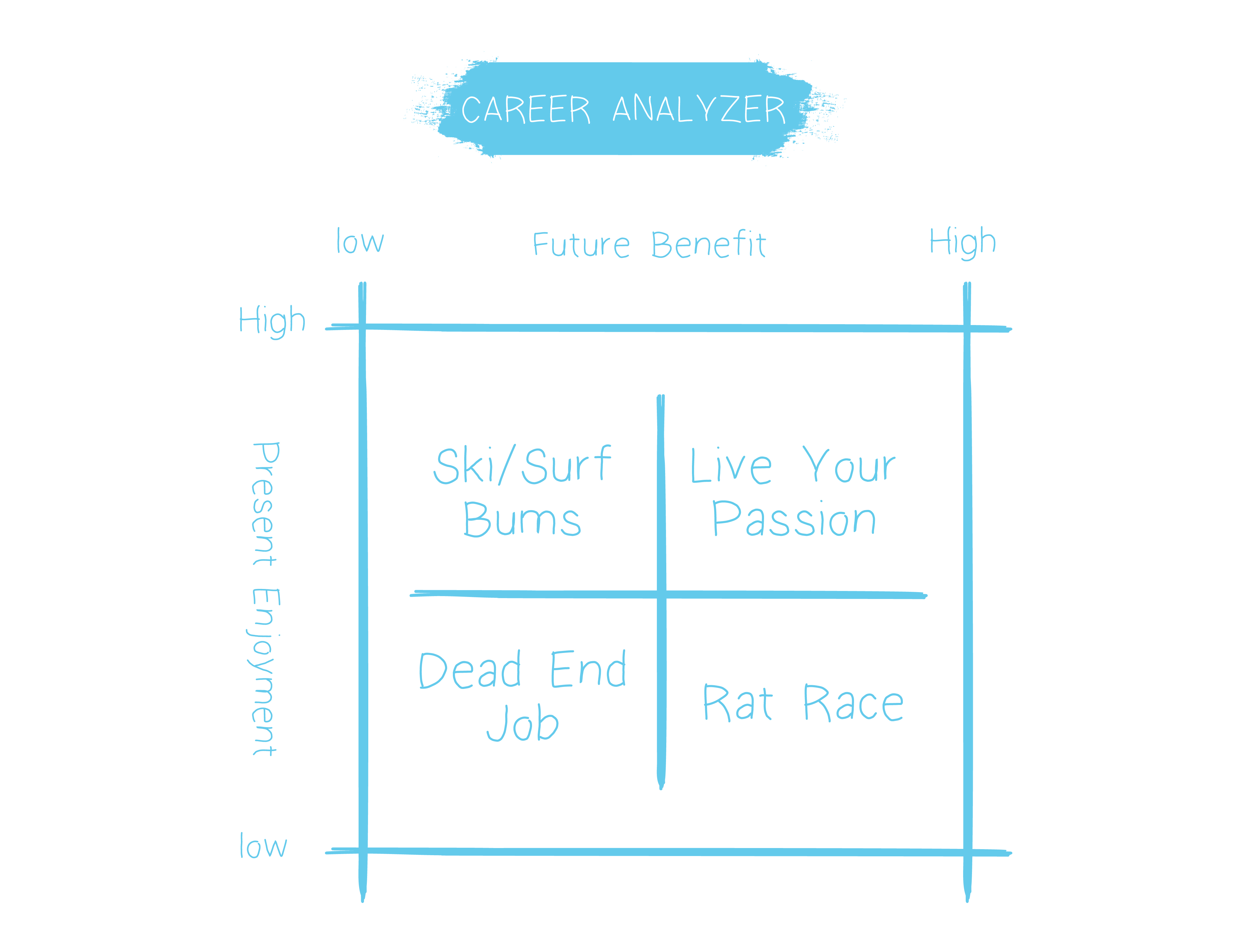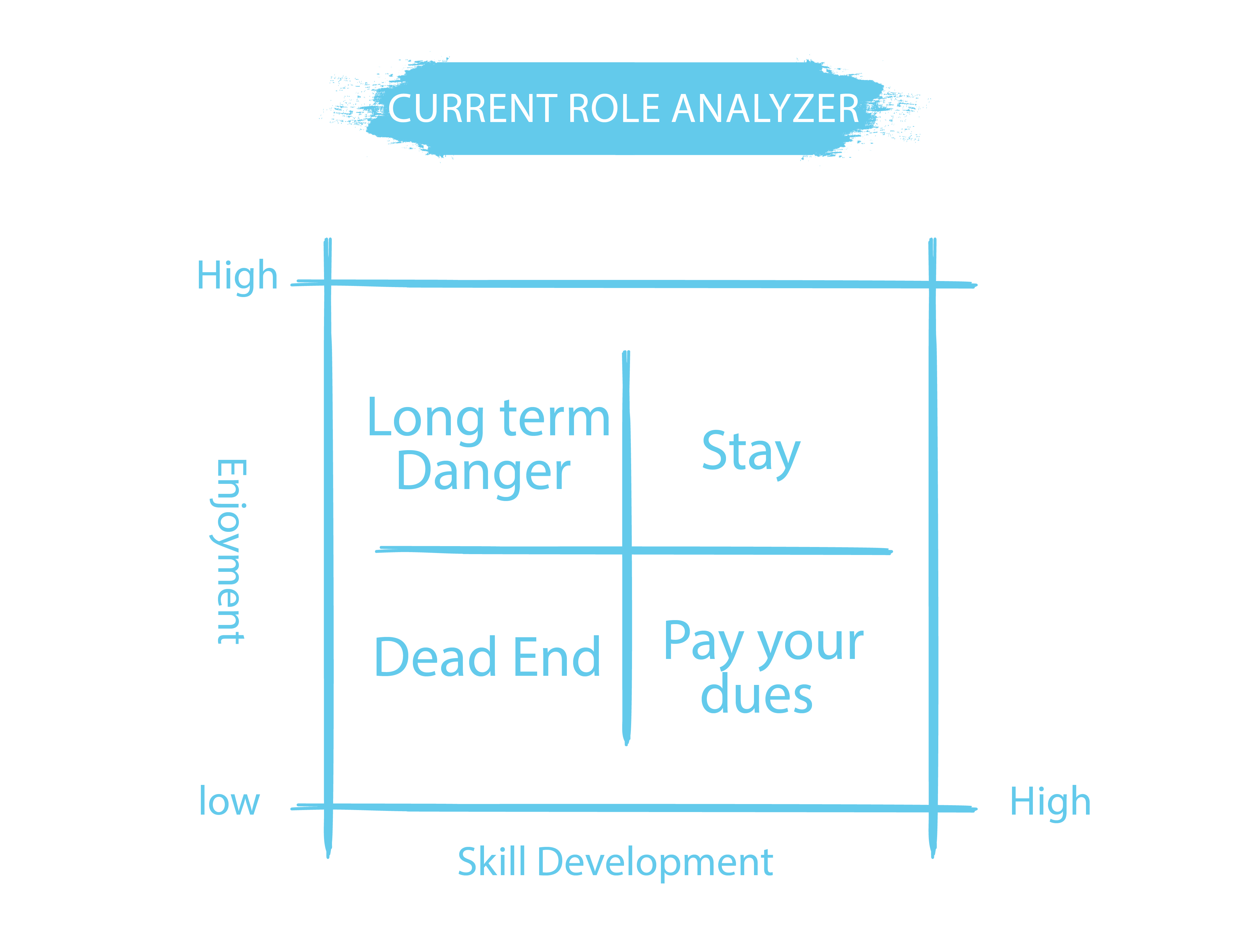- You are here:
- Home »
- Career Advice
- » Are You In The Right Career?
Are You In The Right Career?
Periodically taking the time to review your current job as well as your broader career ambition is critical to a successful career. Think of it like going to get a checkup from the doctor once a year… you may not feel like you need it, but it is a lot better to get a problem diagnosed sooner rather than later.
In this article, I’m going to introduce you to two tools that you can use to quickly evaluate the career path you are on as well as the actual role you currently find yourself in.
Now, the temptation when looking at these types of tools is to evaluate your current position first. There are hundreds of articles offering quizzes and ideas like, “The five signs you should quit your job.†(I even have one here.)
The problem with that is that your current role exists within the context of your broader career ambitions. This means that while you may want to quit every single day, your current job may be a necessary evil to serve your longer career goals.
Yes, unpopular though it may be, sometimes you do just need to pay your dues. So, let’s start by looking at your chosen career path and then consider whether it is the right one for you.
Ask yourself whether the career path you are on will pay off in the future
What it means when we talk about a career paying off in the future isn’t simply about a career paying you well financially. Yes, thinking about compensation in all of its forms is important, but it’s also helpful to think about the payoff from the perspective of meaningfulness.
This could be a payoff in terms of lives changed, people impacted, or anything else that provides you with a sense of meaning. In other words, taking stock of the long-term impact of your career isn’t solely a financial matter.
Naturally, the future payoff of your career exist in shades of gray, so I like to have my career coaching clients use a scale of 0-10, where 0 is no future benefit and 10 is a very high future benefit.
Think of the number for your current career path and write it down.
Next, think how much you enjoy the present day-to-day of what you do. As you think about how much you enjoy the day to day, I would take a moment to remind you that no job is absolutely perfect. Even when you love what you do, there are always moments that are trying.
For example, I love my career coaching practice, but reviewing my accounting each month is not all that pleasant.
So, think about how much you enjoy the day-to-day of your current career and give that a rating, with zero being miserable and 10 being wonderful.
Evaluating your career
Now let’s think about these two scores in the context of the graph below (you can imagine the zero to 10 scale on each axis). As you can see, future benefit goes across the horizontal access from low to high, and present enjoyment goes across the vertical axis from low to high.

This chart, which I like to call the career analyzer, is something I was introduced to by Tal Ben-Shahar while I worked with him at Harvard University.
If you take your two scores, you should be able to place your current career on the chart at the point they intersect, with each quadrant having a different meaning.
The “dead-end job”
In the bottom left corner (low present enjoyment, low future benefit) is the “dead-end job.” This is the job that you don’t like today, and isn’t going to pay off in the future.
If you find yourself here, it should really only happen for one reason: You have bills to pay, you needed to find something and this is what was available.
This can happen to any of us at one time or another. Yes, before my executive career and before Harvard Business School, there was a period of time I was a telemarketer selling credit cards…. I needed money.
The key is that if you find yourself in this spot, keep pushing on your job search as hard as you can. In my case, I was only a telemarketer for three weeks before a really nice job offer came in.
The “ski/surf bums”
If you find yourself in this quadrant (top left), you really like what you do but it isn’t likely to pay off in the future. I labeled this quadrant “ski/surf bums” because many of us know the person who graduated from college and then went and taught skiing for years afterwards.
I’m not knocking teaching and I’m not knocking skiing, and there are some people who do turn teaching skiing into a proper career. But for most people in that quadrant this isn’t really going to pay off in the future.
By the way, this isn’t limited to skiing, surfing and other outdoor sports. There are plenty of people who find themselves doing something they really enjoy today that isn’t going to pay off tomorrow. For those people, it’s probably time to evaluate the cost of their current direction.
Just to be clear, if you love being a preschool teacher, for example, it isn’t likely going to pay off for you in the future financially. However, you influence hundreds of lives and what this means (in my opinion) is that the payoff in the future is potentially huge.
In other words, what defines future payoff is something you need to determine for yourself.
The “rat race”
I have found myself in the “rat race” (bottom right) and most professionals that I know find themselves here as well. They work very hard and they don’t really feel any connection to what they do, but they expect the future payoff to be great.
Payoffs for these individuals often involve titles, prestige and lots of compensation. The problem here is that you aren’t enjoying the day-to-day journey of what you’re doing. As you can see in my article “Career Coaching: Is this all there is?”, the challenge is that often achieving the career goals that you have won’t make you happy.
The result is that you have spent years (maybe decades) doing something you don’t enjoy to attain something that ultimately doesn’t make you happy.
A value judgment
I do find it interesting that many people who are in the “rat race” will drill the “ski/surf bums” about their careers going nowhere and ask them questions like, “How will you ever pay for retirement or healthcare?â€
Meanwhile, the “ski/surf bums” accuse the “rat racers” of wasting their lives at a desk, never experiencing life, not living in the now, etc.
In fact, each is simply a value judgment that justifies what that group has chosen to do. What I propose is that both groups look to find (or create) opportunities to move to the “”live your passion” quadrant.
The “live your passion”
The goal in the “live your passion” quadrant (top right) is to enjoy the journey AND the destination. In fact, I believe that most “ski/surf bums” and “rat racers” would prefer to move in this direction, they just aren’t necessarily sure of how to do it.
However, it can be done. I have had clients move from the “rat race” to the “live your passion” quadrant. It requires a clear strategy, lots of networking, and plenty of persistence, but it is possible.
Taking action
The first conclusion you may draw from the career analyzer exercise is that you need to immediately take action and move out of your current role.
Not so fast.
There is a second tool to help you evaluate the job you are in today.
Once again we are going to map your score on a chart, but this time the critical question is to what extent are you developing transferable skills in your current role.
Think about this from the perspective of transferable skills that you could use in other companies, industries or areas that are perhaps more likely in the “live your passion” quadrant that we talked about earlier.
Here are a few examples: If you are a ski instructor you may be developing valuable teaching skills, if you are a consultant you may be developing excel skills that would apply to many industries, if you are working as a telemarketer you may be learning to sell.
The point is that as long as you are currently developing skills, there is value to what you are doing.
So, ask yourself how much skill development you are getting in your current role, with 0 being none and 10 being a lot.
Next take your present enjoyment score from earlier and look at the diagram below.

Obviously, if you find yourself in the position of high enjoyment and high skill development you want to stick around for a while, at least until you have mastered the skills to be learned in your current role.
Likewise, if you don’t like the day-to-day, you aren’t developing skills and the only reason to stick around is because you need a paycheck – you need to get started on a job search.
The trickier places are the top left and bottom right of the chart.
If you find yourself in the bottom right, where you aren’t enjoying the present but are developing skills, it may be worth sticking around for a bit.
As an example, I found the hours of management consulting absolutely brutal (though I did enjoy the work), but I was learning a tremendous amount of new skills each day.
The solution, if you find yourself in this position, is to stay on board until you feel like you have developed the skills the role is likely to teach you. Then, move on.
But be careful! This can look a lot like the “rat race.” The key is to develop the skills so that you can get out of the “rat race” after “paying your dues†and developing skills that will serve you in a career where you enjoy the journey and the destination.
You can’t be a physician before being put through the ringer of residency, but the skill development gained there is critical, as an example.
The other dangerous quadrant is the top left. This is a very, very easy place to get stuck.
Based on my clients I find that this story typically involves someone taking a role that they enjoy that pays well. They master the role but then find there is no opportunity for growth or advancement within it.
Still, because the position pays well, they stick around. The problem comes a few years down the road, when suddenly their skills are dated and they find themselves on the job market. That’s when they call a career coach.
If I could emphasize one point it would be this: we work in a highly competitive global market economy. If you aren’t constantly developing skills you are becoming obsolete and less valuable. Never take a job or stay in a job where you aren’t developing.
So, in conclusion, seek a career where you will enjoy the journey and benefit when you reach the destination. In the process, as you work towards your career goals you may need to take positions that you don’t enjoy, but whatever you are doing, if you aren’t developing skills, move on to the next opportunity.
Enjoy your career journey!
Thinking of hiring a career coach to help you transition into a new career that you love? Connect with George Karris, browse our directory of career coaches and get a FREE consultation or request a personalized coach recommendation!
About the Author George Karris
George Karris is a former corporate executive who coaches professionals on how find opportunities that balance their ambition, purpose and overall happiness. He has a track record of professional success that includes setting strategy for a $4B firm, raising millions for a startup, and leading a team of over 200 people. He has an MBA from Harvard Business School and has studied positive psychology with Tal Ben-Shahar, Shawn Achor and Tony Schwartz. Connect with George on Noomii and his website.

